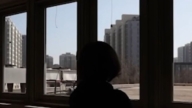【新唐人2011年10月15日讯】广东佛山市“住房和城乡建设管理局”,原定从10月12号起,放宽佛山市居民购买楼房的限购条件,不过政策朝令夕改,住建局12小时后再次发布通告“暂缓执行”这项放宽政策。专家分析指出,事件显示,“房屋限购政策”已导致地方财政濒临危机,而中共中央仍拿不出政策,只能要求地方“限购”。
大陆中央去年下半年曾出台“新国五条”,随后更多城市出台限购令。近一年来,各地房产成交量明显减少,而价格却没有大幅度下降。
10月 11号上午,佛山市“住房和城乡建设管理局”发出通知,从10月12号起放松对四类人的限购。不过,12小时后,住建局又发布公告“暂缓执行”。公告暂缓的原因是“为了进一步征询社会各界意见,并综合评估政策影响”。
香港《亚洲周刊》报导,“暂缓执行”动作源于李克强的电话通知。报导说,目前李克强主抓房地产市场调控与保障房建设,而且预计他将接任总理,因此房地产泡沫一直延续下去对他接任后的工作颇为不利。
不过,大陆十一期间房地产成交惨淡,加剧了地方政府的恐慌情绪。中国《证券报》表示,在房市调控政策不断加码背景下,今年以来建商资金回笼缓慢、市场预期悲观,除了土地与房屋市场持续惨淡,房市深度调控最显着特征就是地方政府土地财政大幅下滑。
报导说,部分城市因为土地财政大幅滑落,转向“温柔”限购。对于这种“温和”限购应及时制止,否则若任由风气蔓延,将导致房地产宏观调控政策效果打折扣。
深圳当代社会观察研究所所长刘开明表示,限购政策解决不了问题。
深圳当代社会观察研究所所长刘开明:“我们知道地方政府土地的收入与房地产,已经成为各地方的财政收入的重要来源。房地产价格下降,会影响地方的财政收入。限购政策并不是市场调节的办法,它﹙中央﹚还是采用行政的手段来限制交易,我觉得这不是长久之计。”
广东维权律师唐荆陵也指出,地方利益集团当然希望放宽限购条件,让更多人来买房,但这个泡沫体系只是哪一天破灭的问题。
广东维权律师唐荆陵:“这个﹙放宽限购令﹚我想不是最后一个,因为地方政府,财政危机很严重的话,他们会想办法突围嘛,因为双方在经济泡沫里面,出现不同的对策嘛,地方政府的对策是保自己的命,中央政府是保它的命,各自想保自己的命,或者保自己的利益,就会出现政策打架的行为。”
据了解,佛山对土地财政依赖程度非常高,去年全市土地出让收入380亿元,而财政收入仅有306亿元,土地出让金与财政比例达到124%。今年前三季度佛山市出让收入183亿元,只有去年全年土地出让收入的48%。
唐荆陵:“作为地方的利益集团和权力机构,他们都希望这个游戏能继续玩,但是从整个国家的宏观经济它已经到了玩不下这个游戏的地步了,像中央当局,金融机构现在面临破产的危机,当局必须得做出一个选择,要嘛就是银行进入破产,要嘛房地产机构卖不出去,他就必须采取这个硬性的限购政策。”
刘开明对《新唐人》表示,中国有半数人口买不起房,却有许多政府官员参与炒房,地方政府一方面也在推高房地产价格。刘开明认为,从佛山市限购令朝令夕改可以看出,中央与地方还是走计划经济路线,不愿意用市场的办法来解决这个问题。
新唐人记者林莉、周平、周天采访报导。
Government’s Game On Property Regulation
Anchor:
“Housing and Urban-Rural Development Authority"
in Foshan City, Guangdong Province, formerly announced,
that from October 12, residents in Foshan City would have
less restrictions on house purchasing.
However, the authorities changed the policy immediately.
After 12 hours they issued a notice “suspending” the policy.
Experts point out that this incident shows
how such a policy can lead to a local financial crisis,
as the Central Committee of the Chinese Communist Party
(CCP) and the local governments’ policies oppose each other.
The Central Committee released a policy of “five new items"
late last year, followed by “restriction policy” in more cities.
Over the past year the number of real estate trades decreased
significantly, while the price has not dropped significantly.
“Housing and Urban-Rural Development Administration"
in Foshan City issued a notice on the morning of October 11,
that since October 12 they would relax the restriction
on house purchasing for people of four categories.
However, after 12 hours, the authorities issued another notice
of “suspending to carry out" this policy.
The reason for the suspension was “to further consult with
the community and assess implications comprehensively."
Hong Kong’s Asia Week reported that Li Keqiang’s
phone call was the reason for this “suspension".
It reported that Li was currently in charge of real estate
market regulation and housing construction protection.
Furthermore, as he is expected to become the next premier,
a real estate bubble would not be a good prospect for him.
The transactions in real estate were very few during October 1
holiday, which exacerbated the panic in the local government.
China’s “Securities" stated that with the continuous changing
of the housing market regulatory policy,
the constructing business’ fund was gradually withdrawn
this year, resulting in pessimistic market expectations.
In addition to land and housing market continuous bleak,
the most notable feature of housing market’s drop
and strong regulation is the land’s financing
large decline for the local governments.
It was reported that due to land finance’s falling,
some cities’ authorities have changed to “soft" restriction.
If this “soft" restriction is not promptly stopped it will
impact negatively the real estate macro control policies.
Liu Kaiming, head of the Contemporary Society Observation
Institute in Shenzhen, said the restriction policy is not wise.
Liu Kaiming: “I knew that land and property revenue
is the major income for the local governments.
The property prices will affect local revenue. Purchase
restricting’ policy is not the way to market regulation.
Central government restricting the trade
is not the final solution.”
Activist lawyer Tang Jingling points out,
that local interests’ groups hope to relax property restriction,
to allow more people to purchase a house,
however, this bubble system will burst out one day.
Tang Jingling: “The relaxation of property restriction’
regulation is not the best,
because if the local government has severe financial crisis,
they will try to break through it.
Both, local and central governments have different
strategies to deal with the bubble economy.
Both, local and central governments protect their interests,
and the strategies just end up opposing each other.”
According to source, Foshan’s revenue depends on properties.
Last year’s revenue from property was RMB38 billion,
with the public finance revenue being RMB30.6 billion,
or 24% lower than the property revenue.
At the end of September this year, the property revenue
only reached RMB18.3 billion, or 48% of that last year.
Tang Jingling: “Local interest groups and authorities want
to carry on this game, however, the country’s macro economy
can not afford to play it. The central government and financial
sectors are facing bankruptcy and authorities have to choose
between bankruptcy of the banks or popping up the real estate
bubble. That’s the reason for the housing restriction strategy.”
Liu Kaiming told NTDTV that half of China’s population
cannot afford to purchase a house.
However, many local officials are involved in the real estate
business, so local government is pushing up the house prices.
Liu believes that Foshan property restriction rapid change
shows that the central government is taking the economy route
instead of using a market strategy to solve this problem.
NTD reporters Lin Li, Zhou Ping and Zhou Tian






























